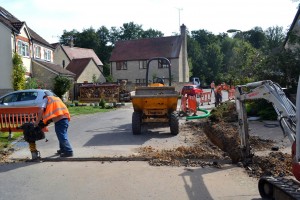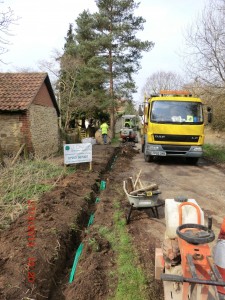Now Gigaclear has covered 50 small villages around the Oxfordshire and other areas of the UK with their service passing 10,000 properties. From this interview, Matthew had mentioned that 4000 households and businesses had bitten the bullet and taken up the next-generation broadband service that Gigaclear offers.
There have been some benefits across the board with the arrival of these next-generation fibre-based broadband services.
For businesses and other income-generating activities, the next-generation broadband services have been valued as an enabler. One of the benefits that has been noticed was a reduction in traffic levels because of a reduced need to travel to work which has become important for the villages that exist within commuting distance of the large towns. Knowledge workers like accountants, consultants and lawyers also benefited because of their increased bandwidth that is available to them at home so they can run their practice or business more effectively.
The food, beverage and accommodation industries have valued these rollouts in a few different ways. Initially they saw the increased bandwidth as a way to improve the Wi-Fi-based public Internet service they provide as an amenity and having a consistently-good experience with this service attracts customers. In the interview, Matthew highlighted Oxford Country Cottages who sell this as a significant amenity for their self-catering holiday cottages. I sent a follow-up email to Oxford Country Cottages regarding their experience with this service and what they identified as a core benefit was the business guests who were returning to these cottages because of the guest-access Wi-Fi that was served by Gigaclear’s fibre-to-the-premises service. This was something that the business guests were finding that was “beyond the norm” for guest-access Wi-Fi networks.
This leads on to the feasibility to use cloud-based business systems which avoids the need to maintain servers on the premises and is considered an essential business tool.
The local communities have benefited from the broadband deployments due to increased cohesion. This was even evident in the initial stages of each project because of the initial curiosity surrounding the projects and that the visibility of the works taking place meant that something good is happening for their village. Some of the townsfolk in each community may want to preserve the status quo but more of them wanted an Internet service better than what the were being provided with.
There have been anecdotal reports of local property values increasing due to the arival of fibre broadband as I have covered before but Gigaclear haven’t seen this as evidence for themselves with any of their rollouts.
But where Gigaclear stands when it comes to providing Internet service is that they will exist as a pureplay broadband provider. That is where their business is about providing an Internet service alone rather than offering a voice telephony or pay-TV service.
Gigaclear are also operating this infrastructure as an infrastructure provider to serve these communities. This is to allow competing retail-level Internet service providers to include the villages in their footprint if they wish to do so.
BT are saying that they are doing the right thing when they are covering Britain’s rural areas but there needs to be a lot more work done to provide a proper level of service for these communities. A lot of these issues aren’t just about adding the necessary equipment but more about making sure that the wiring to the customer’s door is working properly.
What is showing up from the interview is that Gigaclear are putting the pedal to the metal when it comes to deploying infrastructure in to rural communities in order to provide a broadband service that would be considered the norm for big business in the city.

![Cotswolds hill and village picture courtesy of Glenluwin (Own work) [CC BY-SA 3.0 (http://creativecommons.org/licenses/by-sa/3.0)], via Wikimedia Commons](https://homenetworking01.info/wp-content/uploads/2015/06/Village_seen_from_a_mountain_in_the_Cotswolds_-_1983-300x196.jpg)



